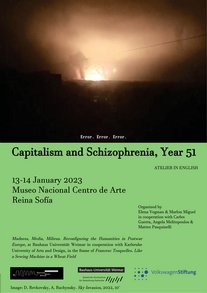International Atelier »Capitalism and Schizophrenia, Year 51« on 13-14 January 2023, at Museo Nacional Centro de Arte Reina Sofía, Madrid, in English
Organized by Elena Vogman and Marlon Miguel
In cooperation with Carles Guerra, Angela Melitopoulos & Matteo Pasquinelli
‘Madness, Media, Milieus. Reconfiguring the Humanities in Postwar Europe’, at Bauhaus-Universität Weimar in cooperation with Karlsruhe University of Arts and Design and Museo Nacional Centro de Arte Reina Sofía.
“How things turn fascist or revolutionary is the problem of the universal delirium about which everyone is silent, first of all and especially the psychiatrists”
“Every delirium is first of all the investment of a field that is social, economic, political, cultural, racial and racist, pedagogical, and religious”
–Anti-Oedipus: Capitalism and Schizophrenia
What is the legacy of Anti-Oedipus today, 51 years after its publication? A major inspiration for feminist and critical theories, and a vector for rethinking sexual politics, Anti-Oedipus directed its scathing critique towards “psychoanalysm” (Robert Castel) and the reduction of psychoanalysis to familialism. Politicizing desire meant including its social, economic, and cultural dimensions into the theoretical and practical field. However, in order to immanently build up their arguments, Deleuze and Guattari engaged precisely with the milieu of critical psychiatry, viz. institutional psychotherapy.
In this two-day atelier, we seek to inquire into the complexity of Anti-Oedipus with regard to its clinical implications – its manifold resonances with institutional psychotherapy and the traumatic experiences of World War II – on the one side, and its perspectives on present-day entanglements between “capitalism” and “schizophrenia” on the other. How did the revolutionary psychiatric work of Francesc Tosquelles, presented by Carles Guerra and Joana Masó in the exhibition “Like a Sewing Machine in a Wheat Field,” prepare the ground for Anti-Oedipus? How might we construct an institutional analysis of the parapolitics of contemporary rising nationalisms, “fossil fascism,” and the continuity of colonial regimes? Is it possible to engage in a critical therapeutic attitude within and beyond these catastrophic horizons?
The atelier also aims at unfolding a number of implicit dialogues and tensions inherent in Anti-Oedipus. How do Deleuze and Guattari engage with the French psychoanalyst Maud Mannoni to show the dangers of the “adaptation police force” that haunts traditional psychiatry? How do they adapt institutional psychotherapy to both deepen their analyses and criticize traditional psychoanalytical concepts? With Jean Oury, they address the traps of extended Oedipalization in which certain anti-psychiatric movements fell; with Gisela Pankow, they denounce the notion of ‘regression’ regarding the formulation of schizophrenia. How then to understand contemporary modes of subjectivity, society and power from the perspective of Anti-Oedipus?
Program
Friday, 13 January (Room 306, third floor, next to Tosquelles´s exhibition)
10.30 Opening remarks
11.00-13.30 Guided Visit of the Exhibition ‘Francesc Tosquelles. Like a Sewing Machine in a Wheat Field’ with curator Carles Guerra
---
16:00 Christopher Chamberlin (University of Essex): “Burst Transferences”
16.30 Elena Vogman (Bauhaus-Universität Weimar) & Matteo Pasquinelli (HfG Karlsruhe): “Catastrophe and Schizophrenia”
17.00 Marlon Miguel (Bauhaus-Universität Weimar): “Social Unconscious”
17.30 Discussion
---
18.00 Coffee Break
---
18.30-20.00 Lecture and discussion
Anne Querrien: “La rencontre d’un philosophe et d’un militant-psychanalyste auprès d’une machine à écrire” (in French)
Respondent: Felix Brieden (Bauhaus-Universität Weimar)
Saturday, 14 January (Room 306, third floor, next to Tosquelles´s exhibition)
11.00 Anthony Faramelli (Goldsmiths, University of London): ‘Crisis and resistance: institutional psychotherapy’s political practice’ (cancelled)
11.30 Gerald Raunig (University of the Arts, Zürich): ‘What does it mean to be “bound by the absence of any bond?” Dissociation, Dissembleage, Windy Kin’
12.00 Olexii Kuchansky (Researcher, Author and Curator): ‘Sensual/Sensational Content: Security, Paranoia, Desire in Ukrainian Artists’ Cinema’
12.30 Discussion
---
Break
---
15.00 Henning Schmidgen (Bauhaus-Universität Weimar): ‘Institutions/Territories’ (online)
15.30 Catarina Pombo Nabais (University of Lisbon): ‘What changed in Deleuze's conception of literature after Anti-Oedipus?’
16.00 Mathias Schönher (Bauhaus-Universität Weimar): ‘Anti-Oedipus, the Book of Machines’
16.30 Discussion
---
17.00 Coffee Break
---
18.00-19.30 Lecture and discussion
Angela Melitopoulos (Artist, HfG Karlsruhe) & Kerstin Schroedinger (Artist): ‘Leros A Psycho-acoustic Cartography’
Respondent: Lisa Schmidt-Herzog (Universität zu Lübeck)



